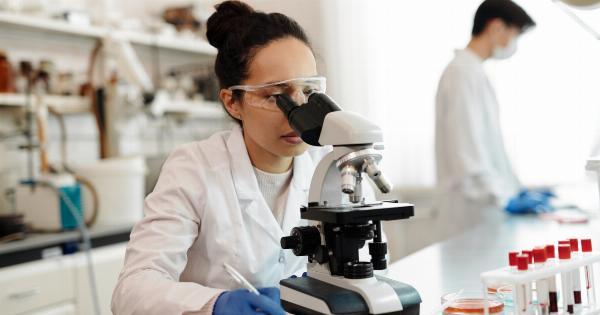Breast cancer is a devastating disease that has taken many lives, especially in women around the world. After successful treatment, some women do experience breast cancer recurrence.
A breast cancer recurrence is the reappearance of cancer cells after initial treatment. The thought of breast cancer recurrence can be scary for women who have survived the disease, and it can impact their quality of life. In this article, we will discuss who is most likely to experience breast cancer recurrence.
1. Women with advanced cancer Stage:
Women with advanced Stage III or IV breast cancer are most likely to experience recurrence.
According to a study published in the Journal of the National Cancer Institute, the recurrence rate for Stage III breast cancer is roughly 18% and the recurrence rate for Stage IV is almost 50%. This is due to the fact that the cancer cells have already spread, making it more difficult for treatment to eradicate all the cancer cells.
2. Women with Hormone Receptor-negative Breast Cancer:
An estimated 70% of breast cancers are positive for hormone receptors (HR). This means that the cancer cells have estrogen receptors (ER) or progesterone receptors (PR) that can be targeted by hormone therapy.
However, women with hormone receptor-negative (HR-negative) breast cancer have a higher risk of recurrence. A study published in the Journal of Clinical Oncology found that women with HR-negative tumors have a 3-year risk of recurrence of 16.8%, compared to 5.4% in women with HR-positive cancers.
3. Younger Women:
Younger women are often diagnosed with more aggressive types of breast cancer, such as triple-negative breast cancer. This type of cancer does not have hormone receptor or HER2 receptor, making it more difficult to treat.
According to a study published in the Journal of Clinical Oncology, women under the age of 40 with breast cancer have a higher risk of recurrence compared to older women.
4. Women with Large Tumors:
The size of a breast tumor is an important factor in determining the risk of recurrence. Women with large tumors (>2cm) have a higher risk of recurrence compared to women with smaller tumors.
This is because larger tumors have a greater chance of spreading beyond the breast and into the lymph nodes.
5. Women with Positive Lymph Nodes:
The presence of cancer cells in the lymph nodes is an important factor in determining the risk of recurrence. Women with positive lymph nodes have a higher risk of recurrence than women with negative lymph nodes.
According to the American Cancer Society, women with one to three positive lymph nodes have a 30% to 40% chance of recurrence, while women with four or more positive lymph nodes have a 40% to 60% chance of recurrence.
6. Women with HER2-positive Breast Cancer:
HER2-positive breast cancer is a type of breast cancer that tests positive for the HER2 protein, which promotes the growth of cancer cells.
Women with HER2-positive breast cancer have a higher risk of recurrence compared to women with HER2-negative breast cancer. According to a study published in the Journal of Clinical Oncology, women with HER2-positive breast cancer have a 3-year risk of recurrence of 19.5%, compared to 7.4% in women with HER2-negative cancers.
7. Women who Have Received Chemotherapy:
Chemotherapy is a common treatment for breast cancer that uses strong drugs to kill cancer cells. While chemotherapy can be effective in destroying cancer cells, it can also cause long-term side effects and increase the risk of breast cancer recurrence.
According to a study published in the Journal of Clinical Oncology, women who have received chemotherapy have a higher risk of recurrence compared to women who have not received chemotherapy.
8. Women with Residual Cancer Cells:
After breast cancer treatment, a small number of cancer cells may remain in the breast or lymph nodes. These residual cancer cells can increase the risk of recurrence.
Women who have residual cancer cells after treatment have a higher risk of recurrence compared to women who have no residual cancer cells.
9. Women with Genetic Mutations:
Some women have genetic mutations that increase their risk of breast cancer recurrence. The BRCA1 and BRCA2 genes are the most well-known mutations associated with breast cancer.
Women with BRCA1 or BRCA2 mutations have a higher risk of developing breast cancer and have a higher risk of breast cancer recurrence after treatment.
10. Women with Poor Lifestyle Habits:
Women who smoke, drink alcohol, have poor diet and exercise habits have a higher risk of breast cancer recurrence.
A study published in the Journal of Clinical Oncology found that women with poor lifestyle habits had a higher risk of breast cancer recurrence compared to women with healthy lifestyle habits.
Conclusion
Breast cancer recurrence can be a real concern for women who have survived the disease and completed treatment. Understanding who is most likely to experience breast cancer recurrence is an important step towards reducing the risk of recurrence.
Factors such as advanced cancer stage, hormone receptor-negative breast cancer, younger age, large tumors, positive lymph nodes, HER2-positive breast cancer, chemotherapy, residual cancer cells, genetic mutations, and poor lifestyle habits can all increase the risk of breast cancer recurrence. Women who are at high risk of recurrence should work with their healthcare provider to develop a personalized plan for monitoring and managing their risk of breast cancer recurrence.




























